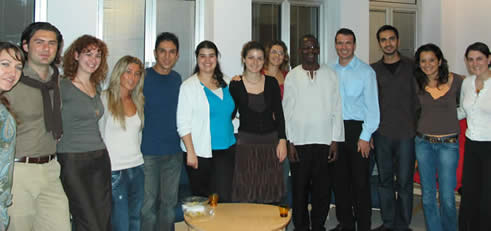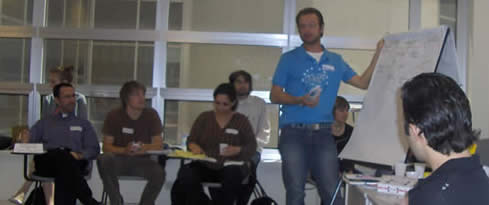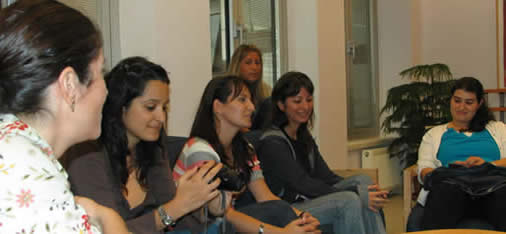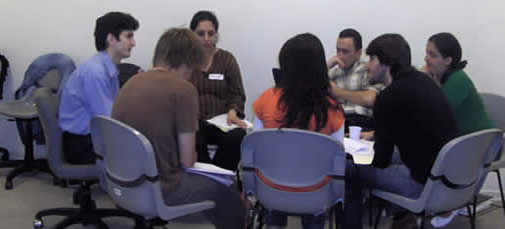Studying in the Conflict Analysis and Resolution Programme (CAR) at Sabanci University was one of the most important steps in my life. Not only for professional and academic life, but also for my personal life, it has contributed to me a lot.
The programme itself has been designed to teach you the main concepts, approaches, theories and practical applications about conflict analysis and resolution at many levels. However, it also enables you to choose the focus for your own work and interests. You have freedom in one sense! J Variety of courses is presented and this provides you an opportunity to focus on your further research.
Apart from practical daily experience, the programme has caused me to gain invaluable knowledge, to write scholarly research papers, to conduct an analysis on different topics, to meet international and national prominent scholars and experts on specific subjects, to participate in international and national workshops and activities, to improve my communication and leadership skills, and most importantly to gain friends from many parts of the world. Moreover, the programme opened my channels to the outside world and made me a person analyzing every single process and interaction through my new lenses J The programme has widened my perspective and changed my way of thinking, seeing and believing for the cases happening in politics, society, economy or even in personal lives. In summary, the programme has enormously contributed to my academic and personal development.
Last but not least, it took me one year to explain what I was studying; when I was at Sabanci…I had to explain to my parents, friends and colleagues. Then I realized that I was studying something very unique and different than other subjects. This encouraged me to study more and to make this topic known in Turkey as well as abroad as much as I can.
Elif Kalan, Class of 2009
The two years (2006-2008) I spent in the Program of Conflict Analysis and Resolution at Sabanci University were among the most creative and enjoyable of my life. During these years I had the chance to attend a plethora of classes related to the interdisciplinary field of Conflict Analysis & Resolution and develop a deeper understanding of conflict, its emergence and dynamics, as well as of the different methods of conflict resolution. At the same time, I was lucky enough to enjoy the continuous encouragement and valuable advice of our professors, whose academic guidance was critical in providing me sound foundations for my further professional life. The visits of a multiplicity of international scholars to our program gave me the opportunity to get engaged in interesting and stimulating academic discussions, to come in touch with a variety of perspectives in the CR field, and come into personal contact with leading academics of our field. Moreover, I was happy enough to be a member of an international group of students, and this helped me come in touch with people of -more or less- diverse backgrounds, thus, broadening my horizons. Above all, the friendship of my colleagues at Sabanci has been one of the most beautiful things I keep form my stay at Sabanci. I am currently a doctoral student at the Institute for Conflict Analysis and Resolution, George Mason University, where the insights I acquired at the Program in Conflict Analysis and Resolution at Sabanci University have been really useful for my academic performance.
Thanos Gatsias (Greek), Class of 2008
The two years I spent in the CA&R program in Sabanci was a very significant phase in my life. Because the program had a comprehensive and multi-discipilinary feature, it taught me lots of important things broadening the way I see, behave and think. In this program not only I had the chance to develop my personal communication skills and background I had had in my undergraduate education, but also I learnt new approaches and abilities which provided me a different point of view. Now, I am working at the student development and support department of Koc University, and I realize that I really benefit from the experience and knowledge I had gained in CA&R program. Therefore I am very happy to be a part of this MA program and have such an education that improves my understanding of the real life and the power of dialogue.
Arzum Kopsa (Turkish), Class of 2008
Conflict Analysis and Resolution program at Sabancı University focuses on both theoretical and practical aspects of studying conflicts in different levels. By studying the theoretical aspect, I had the chance to understand different components of conflicts and possible ways that can be used to resolve conflicts. Moreover, the program's focus on the practical aspect helped me to improve my skills on negotiation, mediation during the simulation exercises and facilitation during the high level workshops. More importantly, thanks to the program, I started to observe the broad literature on social sciences from a different perspective. Towards the end of the program, I received Fulbright scholarship to study PhD in Political Science in the United States starting from Fall 2009. The program really provided an international environment with the students and professors from various countries. In this multi-cultural environment, I had a great time and unforgettable friendships during my two years in the program.
Onur Tanay (Turkish), Class of 2008
Conflict analysis and Resolution is a program of Sabancı University which aims to train students who are willing to solve the intractable conflicts and dialogue problems among masses. I enjoyed to learn about and discover this inter-disciplinary and contemporary topic. More importantly, I feel very priviledged to get this education from one of the top universities of Turkey. Now, I am a PhD candidate at the Political Science Department of Kent State University, Ohio. The university has a Center for Applied Conflict Managemen and I am working there with Prof. Landon Hancock.
Aysegul Keskin (Turkish), Class of 2007

Studying in the Conflict Analysis and Resolution program was one of the most important phases in my education and added a unique dimension to my professional life. First of all, the program, with its multidisciplinary structure and comparative analysis of social sciences, gives students skills to evaluate the causes of conflicts from different points of views. More importantly in today’s dynamic world, the program emphasizes the examination of the structural elements of conflict processes in both theoretical and practical terms. As a result of the examination of those processes, it gives students skills related to designing creative methods to resolve conflict. Thus, besides the program’s significant contribution to the theory, it helps me evaluate the things which can be easily overlooked in daily life more clearly and objectively, such as interpersonal relations, differentiations between groups and diplomatic relations among states.
I am very happy to have an education that gives me a framework for understanding real life and the global system in which relationships occur at the level of people, group and society. Now, I am working at Google - Ireland as an Account Associate. In my work and social life, team-work, and while evaluating any information, I see that this program has one of the biggest roles in my career development.
Gozde BOGA (Turkish), Class of 2006
"The two years spent in the CA&R program in Sabanci were the best years of my life. In this program I learnt skills related to the practical resolution of conflicts, and how to conduct high-level academic research all in an inspiring environment while having fun and building lasting friendships. I know that in the future when I run projects on conflict resolution or conduct research on this topic, my professors from Sabanci and my colleagues from the program will be the ones with whom I want to work. The CA&R program was more than just an amazingly good academic program, I felt it was a family...as in every family, we had our small disagreements every now and then but in the end, when it really mattered, we all supported each other regardless of anything else."
Alexandru Balas (Romanian), Class of 2006

UN Youth Spokesperson for the Millenium Development Goals (2007-2009)PhD candidate, University of Illinois at Urbana-Champaign
The greatest contribution that the Conflict Analysis and Resolution Programme added to my career comes from the way in which the program integrates theory and practice. This programme uniquely both helped me achieve a career in an inter-governmental organization and opened the channels for me to work for a discourse functions through integrating cross-cutting issues. Completing my academic coursework, including classes related to research and practice followed by fieldwork related to conflict resolution, gives me high level of confidence as a professional practitioner of conflict analysis and resolution, a unique field due to its multi-disciplinary nature.
Working in a United Nations Development Programme (UNDP) country office at the project level requires a lot of cooperation with various UN agencies, including collaborating on new initiatives and partnerships. This position also demands research skills to coordinate UN programming at the national level while working in line with global directives. The project that I am currently working with specifically requires high level coordination of cross-cutting issues such as democratic governance, gender and human rights and sustainable development. It also requires networking between different social segments, civil society organizations and government partners. I believe CAR served me well to gain the competencies I need to be successful in this job, including facilitating such dialogues and collaborations.
Asli Sahin (Turkish), Class of 2006

In the summer of 2006, I graduated as one of the international students from Sabanci University’s conflict analysis and resolution program. Attending our graduation ceremony together with my friends from Turkey, Greece and Romania, I could not believe that two years in Istanbul had passed by. The only thing I could think in that moment was that it had been a great time. Being a student in the conflict analysis and resolution program at Sabanci University has made a big difference to my life. I had the chance to work together with the world’s leading scholars in the field. We were taught to think ‘outside the box’, to come up with innovative ideas and to apply our theoretical knowledge to practical contexts. This teaching approach is, in my opinion, unique and invaluable not only for a practitioner’s career but also for further academic study. After graduating, I chose the latter path; I am a graduate student in the applied social psychology program at the University of Sussex in England, where I have the opportunity to work with prominent scholars such as Rupert Brown. My education at Sabanci provided me with expertise that has proven essential for my work at Sussex.
Apart from the exceptional academic and scientific opportunities that are made available through the conflict resolution program at Sabanci University, my time in Istanbul and at Sabanci contributed to my personal growth as well. I met great people, teachers and particularly friends from various cultural backgrounds with whom I not only had a fun time but also the chance to learn and expand my world view. Consequently, from my point of view, I would say to anybody who considers applying to the conflict analysis and resolution program at Sabanci: do so! It was certainly one of the best decisions I ever made.
Katharina Ploss (German), Class of 2006
I am indebted to the master’s program in Conflict Analysis and Resolution for giving me the right incentive and a strong foundation of knowledge and skills to work in the field of intergroup conflict. The knowledge and research skills that I have gained at Sabanci have been essential in developing my program of research during my Phd program, and they are still useful in shaping my research questions and ideas. The interdisciplinary nature of conflict analysis and resolution program was the best way to start my academic career in one of the overlapping disciplines (social psychology) with the field of conflict resolution. In this program I have gained a unique configuration of skills which I don’t think I would have gained in any other master’s program.
I have used the practical skills that I gained at Sabanci in my work with Alliance for Conflict Transformation in facilitating peace education programs between Turkish and Greek Cypriots, in facilitating innovative dialogues (as part of Soliya team) between Arab and American university students, as well as in my continuous work with media reconciliation projects in Africa.
Interaction with students from very diverse backgrounds, interests, and experiences, has been one of the most wonderful learning and enriching experiences and made my time at Sabanci very enjoyable. Now, I am a phd candidate in social psychology with a concentration on Psychology of Peace and Prevention of Violence at University of Massachusetts, Amherst. My research interests include investigation of the effect of group identities on remembering of ingroup’s conflictual past, investigation of international images, intergroup attitudes and emotions in conflict, and building of social trust. Since 2005, I have been part of the academic team working closely with aDutch NGO, Radio LaBenevolencija, on a major media reconciliation project in Greats Lakes Region in Africa (including Rwanda, Burundi and DR Congo).
Rezarta Bilali (Albanian), Class of 2004

I was in the span4 cohort of the CR program at Sabanci. We were only five people then. And the program was really intriguing so I decided to go for the PhD at GMU. I think the Sabanci program is a unique opportunity for academicians and practitioners not only from Turkey but also from other parts of the world especially for students from the Balkans and the Middle East to share their experiences and bring it back to their countries.I believe one of the strongest assets of the CR program is its multidimensional approach to human conflict. This has helped me out a lot in my further studies in the field.
Doga Ulas Eralp (Turkish), Class of 2002